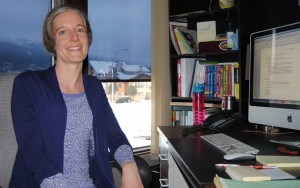
Finding a meaningful and rewarding job is difficult even at the best of times, but for those with a long-term disability it can be an even more daunting task.
Fortunately, a new employment program at the Jasper Adult Learning Centre intends to make it easier for people with disabilities to find a job by providing one-on-one career support and by working with employers to find opportunities for those workers.
“With our program, what we can actually do is we can get to know the client, find out what they can do and then we can approach employers and see if we can tailor-make or modify a job for what they can actually do,” said Ginette Marcoux, director of the learning centre.
Recognizing the social stigma that is often associated with disabilities, the program focuses on what someone can do, rather than what they can’t do, and works with potential employers to demystify disabilities and find a job that is suitable for the skills of the worker.
For Marcoux, a big part of the program is educating the public about the range of disabilities that qualify for the program, which includes depression, addiction, pain, memory loss, learning disabilities, physical limitations and physical health conditions like diabetes.
To get the program up and running, Paula Klassen, a former teacher at Jasper Elementary School, was recently hired by the learning centre to oversee the program, which is funded by Alberta Human Services.
“Once we start tapping into what the client’s dreams and aspirations are I’m going to work with them on a one-to-one basis, helping them set up their resume, identifying gaps in their skill set, finding out if there are any opportunities for training and getting them ready to the point that their skill set matches the job description,” said Klassen.
Once a match between a job seeker and an employer is made, Klassen will then prepare the job seeker to go and meet the employer in person, in some cases even tagging along for support if need be.
“If the job seeker is confident to go on their own then they will do that and if they need additional support, Paula will be their support, not their speaker, because they will be prepped and ready to be able to advocate on their own,” said Marcoux.
“Self advocacy will be really important, so job seekers can clearly articulate their needs to employers.”
In some cases the position will be a try out to see if the job is the right fit.
In other cases, Klassen will actually follow the person onto the job site to help with training or follow up with that person outside of work time to come up with strategies that will help them on the job, such as a checklist if the person has problems with their memory.
There will also be an education component to Klassen’s role, answering any lingering questions staff may have about the person’s disability or helping management to accommodate the person.
“These are actual jobs that are meaningful, that are valuable and they will be considered a valuable team member. It’s not charity work,” said Marcoux.
Ultimately, the success of the program, which has received funding for one-year, will be dependent on people with disabilities using the service and employers reaping the benefits of a reliable, hard working employee.
“I think the most important thing for people with disabilities is that work is a social determinant of health, so when people are working and contributing to society their lives are more meaningful,” said Marcoux
“It’s a win-win for employers and the job seeker.”
Paul Clarke [email protected]
